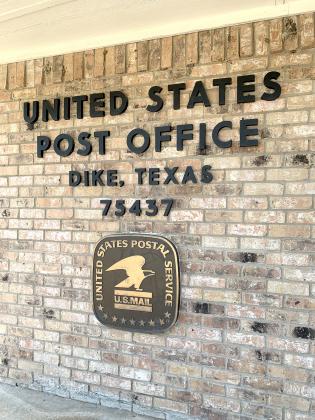USPS may run out of funding nationally
The United States Postal Service currently operates 30,825 post offices and locations throughout the United States. Hopkins County is home to nine USPS offices: Dike, Saltillo, Sulphur Bluff, Pickton, Como, Brashear, Cumby, Sulphur Springs and Sulphur Springs Substation.
The USPS has recently asked Congress for a $75 billion slice of the COVID-19 bailout, according to the Houston Chronicle, and Postmaster General Megan Brennan testified before the House Oversight and Reform committee that the USPS will run out of cash before the end of this fiscal year, which ends in October. Although USPS Dallas/ North Texas media representative Carolyn Hunt told the News-Telegram the postal service has “no plans to close branches anytime soon,” Hopkins County residents report that post offices are critical to connectedness for rural life.
HISTORY
Hopkins County’s first post office was founded 1847 in Weaver for its 73 residents. Sadly, this was also the most recent closure of a post office in Hopkins County. After operating for 107 years, Postmaster J.B. Scott closed her doors in 1954 to the town’s 100 residents. Postal customers took their business down the road to Saltillo, and in the following year, 1955, the Weaver post office experienced a fire that caused moderate damage. Now, Weaver has between 28 and 35 residents and is still served by the Saltillo branch.
Cumby’s post office opened the following year, in 1848, and still remains open. It saw the town through two name changes—first as the town originally called Blackjack Grove, then for one year in 1855 the town was called “Theodosia,” according to Cumby historian Deolece Parmalee. Changing the town’s name caused “a bit of agitation,” Parmalee wrote, so by 1858, the name was changed back to Blackjack Grove.
However, in 1896, it became clear that there were two Texas towns with the name “Blackjack Grove,” and each of them had a post office. The citizens reluctantly allowed the name of the town to be changed to Cumby, Parmalee said, after local politician and former Confederate General Robert Cumby. Until the 1910s, the Cumby postmaster lived at the post office and delivered mail only once per week, according to Parmalee.
The next post office to open was in 1852 in a now defunct town called Retina. It closed in 1867. There are other ghost post offices as well: one opened in 1901 in White Oak and closed in 1904. Brinker had a post office only from 1901 to 1906, although it remains a thriving community. Other longest open post offices include Sulphur Springs (1854) and Sulphur Bluff (1859).
POPULATION
With the exception of Sulphur Springs, all other Hopkins County post offices serve rural populations. Hopkins County is divided up into eight zip codes, and rural zip codes account for approximately 28% of the total Hopkins County population, according to the USPS. The largest rural area, Como-Pickton, accounts for approximately 10% of the county’s population. Cumby’s post office, which serves extant Miller Grove, directly serves approximately 8% of the county’s population. Approximately 53% of the county’s population live in a rural setting and 47% live in a city setting, according to census population data.
IMPACTS
As a county that is more than half rural, being able to use mail service remains important. A government entity, the USPS is legally required to deliver all mail, no matter how rural the address, at a flat rate. This may be especially important to poor rural users, who cannot afford the cost to pay for increased shipping rates of a private service. Hopkins County’s poverty rate is approximately 19.5%, according to the 2018 U.S. Census Bureau. Furthermore, approximately 18% of Americans report using mail service to pay their bills, according to a report by ACI Worldwide.
This becomes important as a May 2019 report from the News-Telegram found that at least half of Hopkins County lacks access to affordable internet access, according to the Federal Communications Commission. Whether using the internet to pay bills or even receive communications, according to FCC data towns that do not have access to cable internet are Tira, Sulphur Bluff, Miller Grove, Pickton, Mahoney, Emblem, Brashear, Saltillo and North Hopkins.
These happen to be the very same locations that are vulnerable to post office shut-downs due to already small populations sizes.
For now, rural Hopkins post offices are safe.
“We’re good,” said Sulphur Bluff employee Chandra Cummings. “It’s a government.”
But to the residents of Hopkins, most rural area post offices will remain a vital service whether or not they receive funding at a federal level.
*An earlier version of this story incorrectly identifies Ms. Parmalee's first name as Ruby. It has been changed to reflect her name as Deolece.



